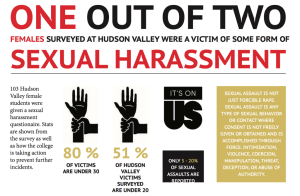Sexual assault prevention efforts due to recent complaints
Jenny Caulfield
Creative Editor

One out of every two females on campus will be the victim of some form of sexual harassment during their time at Hudson Valley, according to a recent survey.
According to a Hudsonian survey last week given to 103 female Hudson Valley students, 52 percent of females said they’ve experienced some form of sexual harassment on campus from other students.
Catcalling, which includes whistling, shouting or saying a comment with sexual nature to a woman passing by, has become something that females on campus have a considerable amount of experience with.
Tierney Carey, a human services major, stayed out of the Campus Center for an entire semester after her experiences being catcalled. Carey claims that she was being harassed by who she understood to be members of Hudson Valley’s football team last year.
“I didn’t go in the Campus Center until the next semester when I had to get my books again because every time I went in there, the same group of guys would be sitting at the stairs and would yell sexual things to me,” she said.
Carey is not the only female student who has avoided the Campus Center due to catcalling. 34 percent of students agree that the Campus Center is the area where the most frequent amount of sexual harassment occurs.
Andrew Barnes, a liberal arts major in his second semester at Hudson Valley, has been an eyewitness to catcalling around campus. Barnes reported that he has witnessed harassment around eight times. The discussion of sexual harassment is not a new topic for Barnes, whose English class last Wednesday had a discussion about the topic.
“In English 102, we had a discussion about what goes on in the Campus Center, and a lot of the girls agreed that once they walk up the stairs, it’s insane how much catcalling goes on on a daily basis in that specific area,” he said.
Barnes, who claims he has never sexually harassed any women on campus, finds the outcomes of it negative to student’s education.
“I feel like it’s kind of obnoxious because we’re all here for a specific reason – to get an education – and [catcalling] kind of distracting and rude,” said Barnes.
With the issue gaining national attention for college campuses, Hudson Valley has planned events and ideas for sexual harassment prevention this semester.
“Bringing in the Bystander” is a prevention workshop to help students with what to do when they see a situation like sexual harassment occur. The workshop, which will be presented for the first time in the Wellness Center on Mar. 17, is intended to teach students how to act in certain situations.
“The idea behind this training is to teach students how to be what’s called a, ‘prosocial bystander,’” said Deanne Martocci, director for the Center for Access and Assistive Technology.
Martocci, one of the administrators leading the workshop, hopes to present students with a learning exercise where they can recognize appropriate or inappropriate behaviors, as well as address the consequences behind sexual assault and violence.
Martocci feels that not all students are aware of what can qualify as sexual harassment, which she also hopes to address in the workshop.
“Part of this training will help students identify what inappropriate behaviors are, like winking and catcalling,” she said.
Martocci is not the only one who feels this way, with 76 percent of the campus thinking that students are unaware that catcalling is a form of sexual harassment.
“Students wouldn’t label [catcalling] as [harassment], and that’s one of the points of this training; trying to get students to wrap their heads around the idea that this behavior is unacceptable and that it is sexual harassment,” said Martocci.
The workshop also is aimed at teaching students what qualifies as consent, which Martocci feels is important to understand.
In addition to this type of workshop being offered to students, campus administrators are talking about modifying the workshop to be offered to faculty and staff.
The college has made attempts to tackle this issue by posting signage across campus with signs defining consent, as well as copies of the national campaign, “It’s On Us”. According to Kelly Sweener, director of the Center for Counseling and Transfer, this is just one way in which the college is addressing behavioral concerns like sexual harassment.
“We do recognize that many individuals lack awareness of what constitutes appropriate conduct and particularly as it relates to what could be considered harassing behavior, stalking behavior, sexual harassment in particular and sexual assault,” said Sweener.
“Ignorance doesn’t absolve someone from responsibility,” Sweener added.
